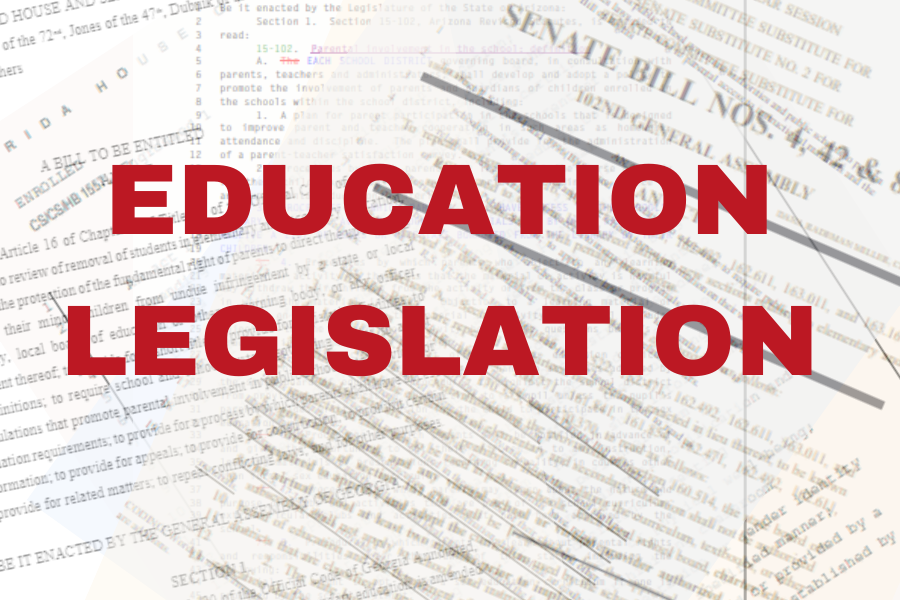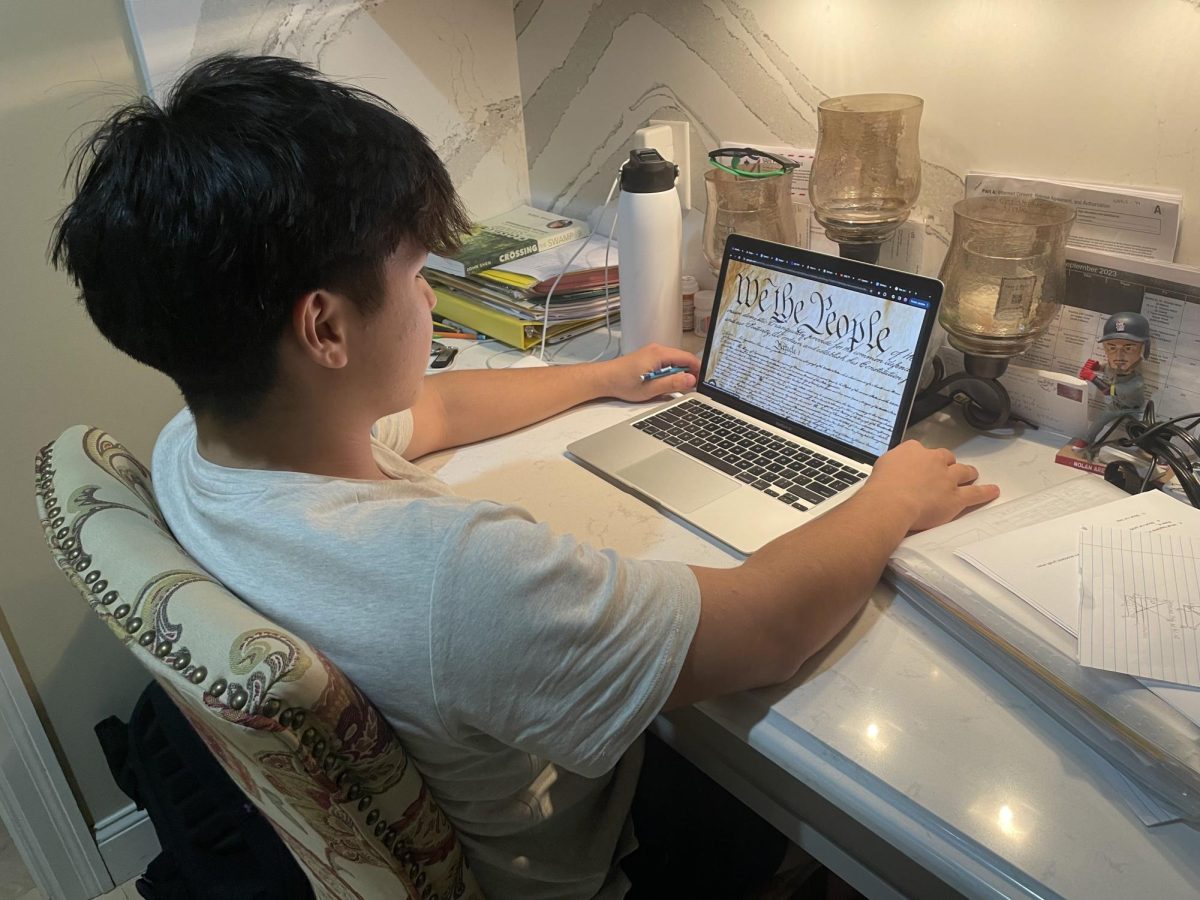Missouri Senate Bill 4 (SB4) passed the State Senate in March and is now in discussion at the House. The bill, sponsored by Senator Andrew Koenig of the 15th district — which includes Parkway West — addresses many issues in elementary and secondary education. However, certain parts of SB4 have generated much controversy among political organizations, parents and teachers alike.
Parent’s Bill of Rights
The “Parents’ Bill of Rights Act of 2023” allows parents to access all curriculum materials and documents from a school where their child is enrolled within two days. Many supporters of this section of the bill believe that it will help parents become more involved in their children’s education and be aware of what is being taught. According to the Show-Me Institute, a Missouri-based think tank promoting and researching public policy, a number of parent groups around the state were organized specifically because they were unable to access information about curricula or teacher training. Show-Me Institute’s Director of Government Accountability, Patrick Ishmael, reports being contacted by dozens of parents interested in pursuing greater transparency and accountability for schools and school districts.
“A Parental Bill of Rights represents a reaffirmation of something that I think parents thought they had before, but during and after the COVID-19 experience, a lot of parents felt like they didn’t have those rights and those powers to properly control and direct their kids’ education,” Ishmael said. “There are a lot of different interpretations and structures for Parent’s Bill of Rights across the country, and they include or exclude different items, but from my perspective, the transparency element is the most important. Whether you’re talking about cities or counties or schools or school districts, the public has a right to know what’s going on with their money. Certainly, parents have a right to know what’s going on with their kids’ education.”
In addition to teaching materials, the bill would give parents access to information about guest lecturers and outside presenters. It also allows parents to access records regarding their child, notifies parents of felony and misdemeanor charges against employees or visitors of the school, and requires parental consent to record biometric data.
“[The Parent’s Bill of Rights] gives [parents] access to school records concerning their child and gives them access to information about the collection and transmission of data on their child and situations involving school safety. I think that makes a lot of sense. Parents should have access to that information if they want to make an informed decision about their child’s education,” Parkway parent Chris Kallaos said.
Some teachers, like National Education Association Representative and history teacher Jeffrey Chazen, are concerned that the bill would not benefit his classroom.
“They already have that information,” Chazen said. “Any parent could see what I’m doing all year, based on just looking at their students’ handouts. Most teachers publish some sort of syllabus before the beginning of the year that highlights what we’re going to teach, so parents can, on day one, figure out what I’m teaching and what the units and lessons [are]. So, for government to say that this is being more transparent is, to me, disingenuous because we’re already being transparent.”
In addition, SB4 requires that all of these course documents are posted online and made accessible through the Department of Elementary and Secondary Education’s website for parents to view. According to district officials, it would cost Parkway $150,000 to hire staff to comply with the bill’s policies.
“Either I’m a professional, or I’m not a professional. And if I’m a professional, then I don’t need to be babysat in order to do my job. There [are] enough babysitters within the Parkway School District that watch and tell me what to do — I don’t need [the] government to do it as well. I’ve been hired to do my job, and I have to be trusted to do my job,” Chazen said. “If you get people who have review possibilities, then the next step is they’re going to tell me how to teach it, and then they’re going to tell me what to teach. That’s where we get into problems with politicians, both on the liberal and conservative side, when they start to dictate their own beliefs into teaching.”

Discussion of certain concepts and beliefs
SB4 also bans the teaching “that individuals of any race, ethnicity, color or national origin are inherently superior or inferior and that individuals, by their race, ethnicity, color or national origin, bear collective guilt and are inherently responsible for actions committed in the past by others.” The bill also clarifies that it should not be used to ban the teaching of historical concepts like segregation or the Holocaust.
Many of the bill’s supporters hope that this section will prevent the teaching of critical race theory (CRT) and similar concepts in elementary and secondary education. While CRT originated as a legal and academic theory that discusses how racism and slavery have impacted social institutions in the United States, many people define the concept differently. Koenig, in a report from May 2022, stated that CRT “leads to the baffling conclusion that every institution and system in the United States, including government, is inherently racist” and denounced its use in the classroom.
While a 2021 Department of Elementary and Secondary Education survey found that only three districts — Kansas City Public Schools, Hazelwood and University City — used critical race theory concepts in their curricula, some groups, such as the Show-Me Institute, are concerned that districts are dishonest in their reporting.
“Regardless of what the underlying curriculum might be, there are lots of approaches to educating kids. Parents should at least know what that approach is. Certainly, there are districts in Missouri that have been explicit that they teach critical race theory. Kansas City Public School District explicitly told us and has told the state that they teach critical race theory in the classroom. I appreciate their honesty about that even though I might have reservations about their use of that material in a K-12 context,” Ishmael said. “My biggest concern is the schools and school districts that are actively trying to avoid being explicit and honest with the public about what they’re teaching kids.”
Ishmael noted that some school districts were charging high costs in exchange for information about course content. Some districts attribute high costs to how long it would take staff to fulfill these requests. Under current laws, public agencies like school districts can charge fees to cover the costs of finding and delivering these records.
“[High fees] means that they don’t want to provide you with information because they expect that you’re not going to pay them for it. There are a number of rural school districts across the state that wanted over $200,000 for these records,” Ishmael said. “It isn’t so much the content, which I think we all disagree. The biggest problem for me is that a lot of parents simply don’t know and can’t judge whether they believe that the curriculum is appropriate or good, or effective. The CRT issue is an important one that there needs to be an honest and open conversation about. But, first and foremost, parents in the public need to know what their tax dollars are funding. And the only way you can get there is with active transparency from schools and school districts.”
However, SB4’s language goes beyond the issue of transparency to specifically address and ban the use of CRT. A lesson that Koenig specifically mentioned was his belief that the Parkway and Rockwood school districts utilized an “Oppression Matrix” in teaching, which he sees as a racist policy. However, Parkway parents have a range of opinions on the issue.
“There [are] pros and cons to teaching critical race theory. My expectation of teachers is that they should present facts and they should teach their students how to think critically about those facts and form their own opinions. The version of the bill that I read essentially says we don’t want schools to adopt beliefs related to critical race theory, but there’s nothing that prevents a teacher from having a discussion about those. That’s a really slippery slope,” Kallaos said. “I err more on the side of protecting free speech, and I would encourage parents that have concerns about critical race theory to have those conversations with our students.”
Nationwide, critical race theory is a widely controversial topic, with 44 states introducing bills to ban its teaching. Furthermore, in 2021, Rockwood teachers faced threats from parents upset about CRT.
“I don’t think I should be told what I can and cannot talk about, especially if we want education to be relevant to what’s going on today. We’ve got to talk about what’s going on today — and that’s going to be both good and bad,” Chazen said. “Any good teacher knows how to control the classroom so that there’s free discussion of ideas, but [the discussion is] not becoming attacking or inappropriate.”
Patriotic and civics training program
The last section of the bill would require the Department of Elementary and Secondary Education to build a patriotic and civics training program for teachers to take in exchange for a one-time $3 thousand bonus. When discussing this section, Koenig stated that he wanted “positive things taught in the classroom.”
However, opponents see little value in creating this training. Missouri public school students are required to take a three-part test on the US Constitution, Missouri Constitution and Missouri Civics to graduate.
“To graduate from high school in [this] state, you have to pass a Missouri Constitution exam. I question the validity of requiring that type of training in elementary and secondary education because I think it’s duplicative of what we already have. Also, the bill doesn’t call out what that training is supposed to look like or what the content of that training is. It’s very nebulous, vague and I think it’s gonna be hard to enforce,” Kallaos said.
Chazen also notes that every Parkway West student must take a government course beginning in eighth grade. Missouri students are required to complete an end-of-course exam in government to graduate.
“We already pushed [civics]. I don’t think we need to do anything above and beyond that. People aren’t going to become effective and active citizens based on what the government requires us to do. They’re either going to care about what’s going on, or they’re not going to care. And I don’t think [the] government’s going to have much control. I think, if anything, it’s going to push people away from being more engaged if it’s forced down people’s throats,” Chazen said.




![Standing in Lambert Airport, French students smile for a photo before their flight. On March 10, the group of students began their 12-day trip to France, accompanied by French teacher Blair Hopkins and Spanish teacher Dominique Navarro. “The trip went smoothly. I think everybody enjoyed all three parts of it: Paris, Nice and the family home stay. The feedback I’ve gotten from all [of] the students has been positive, including several people already trying to plan a trip back to France,” Hopkins said.](https://pwestpathfinder.com/wp-content/uploads/2025/04/IMG_8146-1200x900.jpg)
![Latin students pose for a group photo in front of historical ruins in Italy. From March 13 to March 23, the Latin department traversed cities in Italy to immerse students in an educational experience of a lifetime. “I enjoyed being able to learn about the different cultures. [The trip] encouraged me to see other people's lifestyle and learn more about different histories,” senior Suraiya Saroar said.](https://pwestpathfinder.com/wp-content/uploads/2024/04/PXL_20240318_092633493.jpg)
![From Jan. 22 through Feb. 1, Parkway West High is displaying a wide array of art pieces made by students ranging from elementary to high school. All classes were represented on the displays in both the art wing and the main foyer of the school. “[Art] benefits me because in the middle of a busy day. I can just relax and have some fun doing art and it makes me happy. I think it's important that you show art in the art show so that people can get inspired by it and be inspired to create their own pieces; it’s really impactful,” sophomore Dhiya Prasanna said.](https://pwestpathfinder.com/wp-content/uploads/2024/02/image1-1200x800.jpg)








![Pitching the ball on Apr. 14, senior Henry Wild and his team play against Belleville East. Wild was named scholar athlete of the year by St. Louis Post-Dispatch after maintaining a high cumulative GPA and staying involved with athletics for all of high school. “It’s an amazing honor. I feel very blessed to have the opportunity to represent my school [and] what [it] stands for,” Wild said.](https://pwestpathfinder.com/wp-content/uploads/2025/05/unnamed-6-1200x714.jpg)
![The Glory of Missouri award recipients stand with their certificates after finding out which virtue they were chosen to represent. When discovering their virtues, some recipients were met with contented confirmation, while others, complete surprise. “I was not at all surprised to get Truth. I discussed that with some of the other people who were getting the awards as well, and that came up as something I might get. Being in journalism, [Fellowship of Christian Athletes and] Speech and Debate, there's a culture of really caring about truth as a principle that I've tried to contribute to as well. I was very glad; [Truth] was a great one to get,” senior Will Gonsior said.](https://pwestpathfinder.com/wp-content/uploads/2025/04/Group-Glory-of-Missouri.jpg)

![Freezing in their position, the Addams Family cast hits the “rigor mortis” pose after cast member and senior Jack Mullen, in character as Gomez Addams, calls out the stiff death move. For the past four months, the combined company of cast members, orchestra pit, crew and directors all worked to create the familial chemistry of the show. “I’m excited for [the audience] to see the numbers, the music, the scenes, but I also just love all the technical aspects of it. The whole spectacle, the costumes, makeup and the people that put in the work backstage in order to make the show successful on stage. I’m excited for people to see and appreciate that,” Mullen said.](https://pwestpathfinder.com/wp-content/uploads/2025/03/DSC0116-1200x800.jpg)
![This is the first year that the Parkway West Science Olympiad team competed at regionals. Team member and junior Anish Jindal competed in several events including Chem Labs, Experimental Design and Geological Mapping, earning top five placements in several events. “Compared with some of the other academic competitions at West [that can be] difficult to figure out how to get better, [Science Olympiad] is a lot more inclusive, having a broad group of people with different specialties,” Jindal said.](https://pwestpathfinder.com/wp-content/uploads/2025/03/DSC0391-1200x800.jpg)
![Raising his arm for a high five, freshman Abram Brazier plays with Early Childhood Center students during his first visit of the semester. Brazier joined his assigned class during their designated outdoor time. “[Child Development] gives me experience with how to talk [to] kids. We read them a book so knowing how to talk to them [was helpful]. Most of the [preschoolers] just came right up to us [and] played around,” Brazier said.](https://pwestpathfinder.com/wp-content/uploads/2025/01/gallery2-1200x800.jpg)
![Adding a tray of canned corn to the pile, junior Michael Collop assists in transporting donations for the Holiday Food Drive. The event, hosted schoolwide from Dec. 10-17, raised over 5,000 food items to deliver to the Parkway Food Pantry, helping several families in need. "[The drive] is a great thing for us to do because you're giving to those who are less fortunate, and it helps provide for people who can't provide for themselves. [The] competition is always fun, too. It was fun to be in [social studies teacher Jeff] Chazen’s class, because he always gets worked up over [the competition]. He made it exciting, and was always convincing us to turn in cans for the drive,” Collop said.](https://pwestpathfinder.com/wp-content/uploads/2024/12/feature-photo-unsung-2.png)
![Principal John McCabe announces that Jeffrey Chazen has won Teacher of the Year. Chazen was discussing freedom of speech with his AP Government class when the door opened and administrators rushed in. “[I was] extremely happy and humbled, but mostly shock[ed]. I've been here longer than any other teacher, so I know most of the people on the list of Teachers of the Year, and they are amazing teachers themselves,” Chazen said. “It's just nice to be on the list with them, including [social studies teacher Kristen] Collins, who is the only other social studies teacher who has won Teacher of the Year. It was nice to bring something back to the social studies department.”](https://pwestpathfinder.com/wp-content/uploads/2024/12/DSC_0021-1-2-1200x801.jpg)

Lauren Holcomb • Jun 3, 2023 at 10:26 am
this article is so good you’re so talented I love you